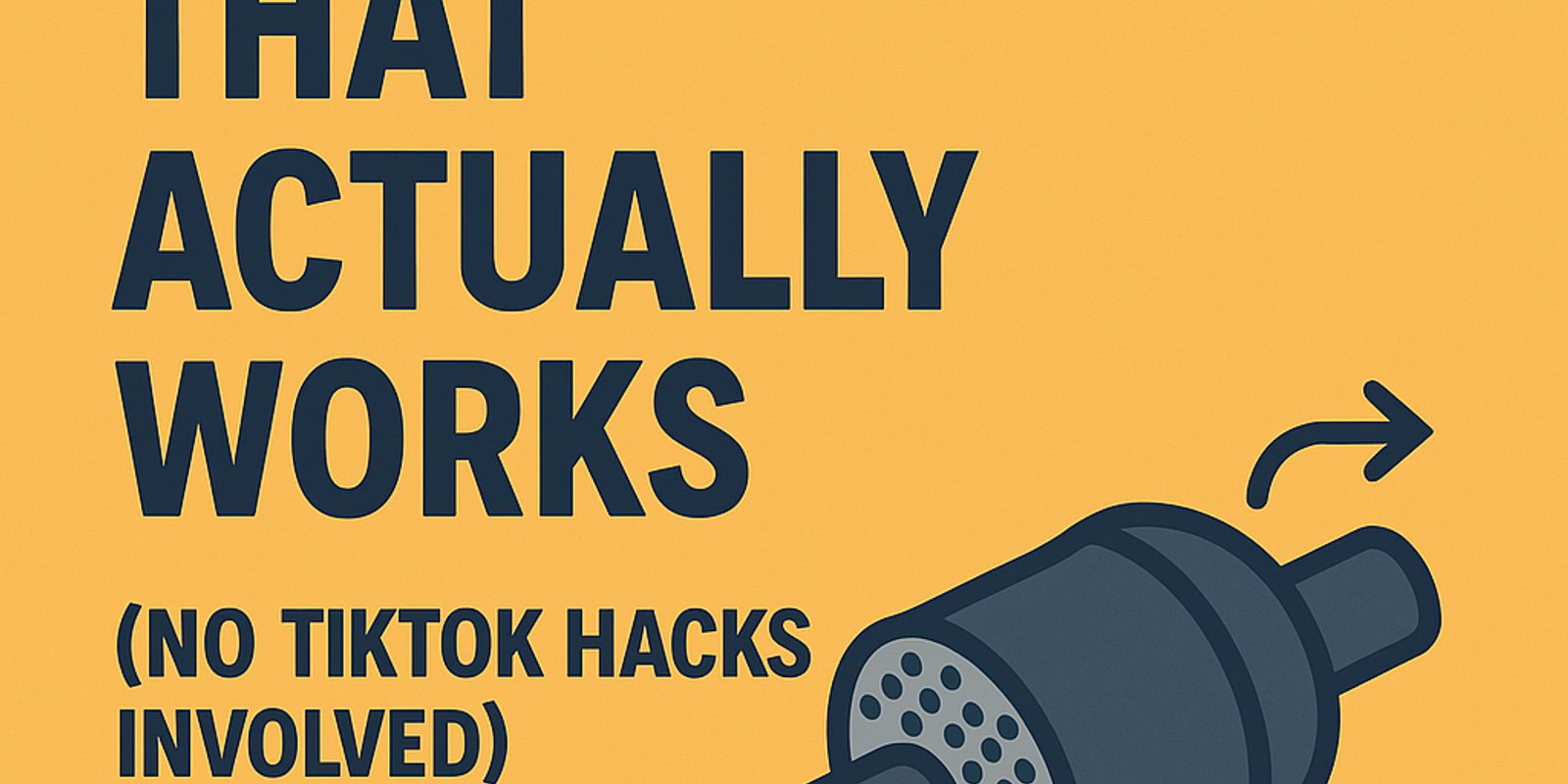DPF Cleaning That Actually Works (No TikTok Hacks Involved)
Replacing a diesel particulate filter can cost anywhere from $1,800 to $8,000, but cleaning a dpf typically costs a fraction of that amount. For vehicle owners and fleet managers dealing with clogged dpf filters, understanding proper maintenance can save thousands while keeping your diesel vehicle’s exhaust system compliant with environmental regulations.
A diesel particulate filter serves as a critical component in your vehicle’s emissions control system, trapping harmful soot particles from diesel combustion. Over time, these particles accumulate and can significantly impact your engine’s performance and fuel efficiency. This comprehensive guide will walk you through everything you need to know about dpf cleaning, from recognizing warning signs to choosing between professional dpf cleaning services and DIY methods.
Busting the Biggest DPF Cleaning Myths: What NOT to Do
Before we dive into the nitty-gritty of proper dpf filter cleaning, let’s have a little fun debunking some of the most ridiculous and persistent myths floating around the internet. Spoiler alert: your DPF is NOT a dishwasher, and highway runs won’t magically clean it either.
Myth #1: Pressure Washing Your DPF is a Great Idea
Sure, it sounds tempting to blast that soot and ash away with a high-pressure hose. But here’s the reality: pressure washing can damage the delicate ceramic substrate inside your dpf filter. Think of it like using a fire hose on a fine china teacup — not exactly a recipe for success.
Why it doesn’t work: The high-pressure water can crack or erode the ceramic honeycomb structure, leading to costly replacements. Plus, water doesn’t eliminate hardened ash — the real culprit clogging your filter. So unless you want your dpf to turn into a sieve, skip the pressure washer!
Myth #2: Oven Cleaner or Household Chemicals Will Do the Trick
We get it, you want a quick fix with stuff you already have at home. But spraying oven cleaner into your dpf? That’s a big no-no.
Why it doesn’t work: Household chemicals aren’t designed for diesel particulate filters and can cause chemical damage or leave residues that interfere with your vehicle’s sensors, including the crucial pressure sensor and sensor hose. Your dpf is a high-tech component, not a kitchen appliance. Unless your car doubles as a toaster, keep the oven cleaner in the kitchen!
Myth #3: Just Take Your Car on a Long Highway Run
Ah, the classic “just drive it off” advice. While some soot can burn off during high-temperature driving (called passive regeneration), it’s not a cure-all.
Why it doesn’t work: Highway runs only help with soft soot deposits, not the stubborn ash particles that build up over time. Plus, if your dpf is heavily clogged, you might not even be able to reach the speeds needed for regeneration cycles without risking engine damage. So, no, your daily commute to the shops won’t cut it.
Myth #4: Add Some Mystery Fuel Additive and Forget About It
There are countless products claiming to “clean your dpf” by adding them to your fuel tank. While some additives can help maintain dpf health, they’re no substitute for proper cleaning.
Why it doesn’t work: Additives mostly assist with soot burn-off, but hardened ash remains untouched. Relying solely on additives can delay necessary maintenance, leading to increased fuel consumption and bigger problems down the road. It’s like putting a band-aid on a leaky pipe — not exactly a long-term fix.
Understanding Blocked DPFs: What Happens When Your Filter Gets Clogged
If you want to dive deeper into the causes and consequences of a blocked dpf, check out our detailed blog on Blocked DPFs. In short, a blocked diesel particulate filter restricts exhaust flow, causing increased fuel consumption, reduced engine power, and potentially triggering limp mode to protect your engine.
The main culprits behind blockages are soot and ash particles that accumulate over time. While soot can be burned off during regeneration cycles, ash is a stubborn residue that builds up and requires professional removal.
How Professional DPF Cleaning Works: The Real Deal
Now that we’ve cleared up the myths and understand the risks of a blocked dpf, let’s get into the proper cleaning process that actually works to restore your diesel particulate filter dpf.
Thermal Cleaning Process: The Oven Bake Your DPF Deserves
Professional cleaning commonly involves a thermal cleaning process that involves baking the dpf in a specialized oven at high temperatures. This controlled heating oxidizes soot deposits and burns them off, turning them into ash.
After baking, the filter is carefully cooled to avoid thermal shock that could damage the ceramic substrate. Then, the dpf undergoes compressed air cleaning, where high-pressure air pulses remove the loosened ash particles from the filter channels.
Compressed Air and Special Drying Cabinet
Following thermal treatment, compressed air blasts through the dpf to clear out the remaining ash. This process is carefully monitored using the front pressure sensor and sensor hose to ensure no damage occurs.
After cleaning, the dpf is placed in a special drying cabinet to remove moisture without causing harm, making sure it’s ready for reinstallation.
Advanced Cleaning Techniques
Some professional services also use ultrasonic cleaning, where the dpf is submerged in a high temperature water tank. Vibrations generated by ultrasonic equipment help dislodge stubborn soot and ash without damaging the filter.
These advanced cleaning methods safely remove contaminants while preserving the integrity of your dpf filter.
Preventive Maintenance: Keep Your DPF Happy and Healthy
Proper maintenance extends the life of your diesel particulate filter and saves you money on costly replacements.
Keep an Eye on Your EGR Valve and Fuel Filter
A dirty egr valve increases soot production, leading to faster clogging of your dpf. Regular cleaning or replacement of the egr valve and fuel filter helps reduce particulate buildup and keeps your engine running efficiently.
Regular Forced Regeneration and Highway Driving
While highway driving alone won’t clean a blocked dpf fully, periodic forced regeneration using diagnostic tools can help burn off soot deposits. Operating your engine at 2000-3000 RPM during highway driving supports natural regeneration cycles.
Use Quality Oil and Fuel
Using the correct engine oil with low ash content and clean fuel reduces the amount of particulate matter produced, lowering the frequency of dpf cleaning needed.
Cost Considerations: Why Proper Cleaning Saves Money
Replacing a new dpf can cost thousands, but professional dpf filter cleaning typically costs just 10-20% of that price. Regular cleaning reduces increased fuel consumption and extends filter life, saving you money in the long run.
Why Clean Flow DPF is Brisbane’s Trusted Mobile Solution
Clean Flow DPF offers expert on-vehicle chemical cleaning and diagnostics right at your doorstep in Brisbane.
Proper Diagnostics
Our technicians use advanced tools to check your dpf’s health, including sensor readings and exhaust flow tests. This ensures you get the right treatment the first time — because guessing games are for trivia nights, not your vehicle.
On-Vehicle Chemical Cleaning
We clean your dpf chemically while it’s still fitted to your vehicle, effectively removing soot and ash without harming the filter or sensors. It’s like a spa day for your diesel particulate filter, minus the cucumber slices.
Mobile Convenience
We come to you — at home, work, or wherever your vehicle is parked. No downtime, no towing, just quick and efficient service. You get to keep your wheels rolling and your life hassle-free.
Frequently Asked Questions (FAQs)
How often should I get my dpf filter cleaning done?
Cleaning frequency depends on your vehicle type and driving habits. Heavy-duty trucks may need cleaning after 600,000 km, while light commercial vehicles might require it every 90,000 km.
Can I clean my dpf at home safely?
DIY cleaning can help with light soot buildup but won’t remove ash particles. Professional cleaning is necessary for thorough maintenance.
What happens if I ignore dpf cleaning?
Ignoring cleaning leads to clogged filters, increased fuel consumption, reduced engine performance, and costly repairs or replacement.
Final Thoughts: Keep Your DPF Soot-Free and Happy
Your diesel particulate filter deserves better than internet myths and DIY disasters. Regular maintenance with trusted professionals like Clean Flow DPF keeps your vehicle running smoothly, saves you money, and helps reduce harmful emissions.
So next time you hear “just pressure wash it” or “take it for a long drive,” remember: myth busted! Call Clean Flow DPF for the real deal in Brisbane.
Stay soot-free and keep on truckin’! 🚛💨


